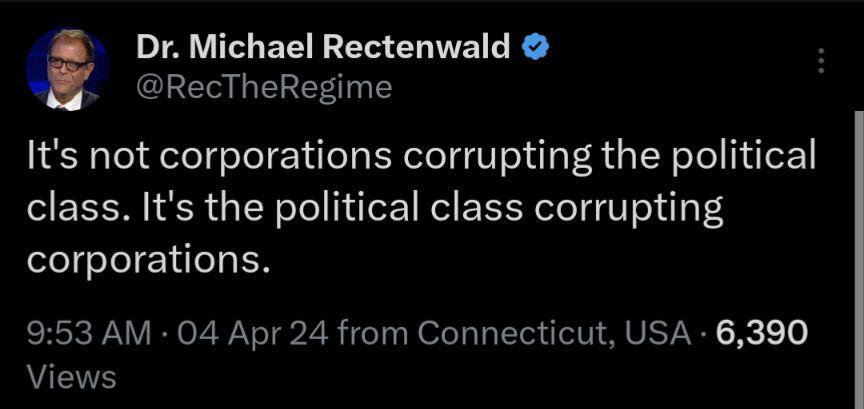MichaelMatulef on Nostr: Government regulation and intervention in the market create opportunities for ...
Government regulation and intervention in the market create opportunities for politicians to extract benefits from businesses, thereby leading to corruption.
The state has a monopoly on the use of force, which enables it to impose regulations and laws on businesses. These regulations can create barriers to entry, restrict competition, and protect incumbent firms, all of which benefit established corporations at the expense of consumers and new entrants. In order to gain favorable treatment or avoid punitive measures, corporations may feel compelled to make campaign contributions, hire lobbyists, or provide other incentives to politicians. This creates a system of crony capitalism, where politically connected businesses are able to secure advantages over their competitors through influence peddling rather than through superior products or services.
While corporations may indeed engage in corrupt practices, the root cause of the problem lies in the coercive nature of the state and its ability to regulate the economy. By creating a system of privilege and protectionism, the political class invites corruption and undermines the functioning of markets. We must advocate for the complete abolition of the state and the establishment of voluntary, competitive systems for resolving disputes and protecting property rights, which would minimize opportunities for corruption and lead to more efficient and just outcomes.

The state has a monopoly on the use of force, which enables it to impose regulations and laws on businesses. These regulations can create barriers to entry, restrict competition, and protect incumbent firms, all of which benefit established corporations at the expense of consumers and new entrants. In order to gain favorable treatment or avoid punitive measures, corporations may feel compelled to make campaign contributions, hire lobbyists, or provide other incentives to politicians. This creates a system of crony capitalism, where politically connected businesses are able to secure advantages over their competitors through influence peddling rather than through superior products or services.
While corporations may indeed engage in corrupt practices, the root cause of the problem lies in the coercive nature of the state and its ability to regulate the economy. By creating a system of privilege and protectionism, the political class invites corruption and undermines the functioning of markets. We must advocate for the complete abolition of the state and the establishment of voluntary, competitive systems for resolving disputes and protecting property rights, which would minimize opportunities for corruption and lead to more efficient and just outcomes.

